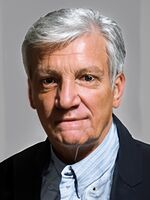Fourth Pugh government: Difference between revisions
(Created page with "{{Infobox government cabinet | cabinet_name = Ministry of Llywelyn D. Pugh IV | jurisdiction = BlakeIsHere | flag = Flag_of_BlakeI...") |
No edit summary |
||
| Line 4: | Line 4: | ||
| flag = Flag_of_BlakeIsHere.png | | flag = Flag_of_BlakeIsHere.png | ||
| flag_border = true | | flag_border = true | ||
| image = Llywelyn Pugh 1990.jpg | | image = Llywelyn Pugh 1990 cropped.jpg | ||
| caption = Pugh in 1990 | | caption = Pugh in 1990 | ||
| date_formed = 12 July 1988 | | date_formed = 12 July 1988 | ||
Revision as of 19:37, 5 June 2023
Ministry of Llywelyn D. Pugh IV | |
|---|---|
Cabinet of BlakeIsHere | |
 Pugh in 1990 | |
| Date formed | 12 July 1988 |
| People | |
| Head of state | George Owen |
| Head of government | Llywelyn Dafydd Pugh |
| No. of ministers | 16 |
| Member party | Loyalist Party |
| Status in legislature | Minority |
| Opposition cabinet | Shadow Cabinet of Sevyn Robbins |
| Opposition party | Socialist Party |
| Opposition leader | Sevyn Robbins |
| History | |
| Election(s) | 1988 |
| Predecessor | Third Pugh government |
| Successor | First Jones government |
Llywelyn Dafydd Pugh formed the Fourth Pugh government (officially the Ministry of Llywelyn D. Pugh IV), a Loyalist minority government, following the 1988 general election after being invited by both President Carlyle Descoteaux and Emperor of the Dell Planet Albert IV to form a new administration. Before the election, Pugh had led three other governments, with the previous being the Third Pugh government, a coalition government that consisted of members of the Loyalists and the Moderates, with Moderate leader Andreas Reece as Deputy Prime Minister.
The 1988 general election resulted in a victory for the Loyalists but also resulted in a Hung Parliament.
Due to the government crisis around this time, which resulted in the resignation of many cabinet members, Pugh announced he would resign as prime minister, just 3 weeks after the last general election. He was succeeded by Secretary for International Relations David Jones (who was dismissed from the position a month before the election) as Prime Minister afterwards.